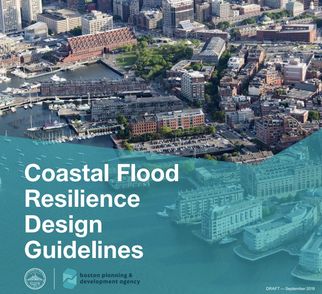Recommended Flood Zoning Overlay District Impacts Future Coastal and Inland Development Projects
by Bruce L. Jacobs, PhD, PE, BSCES President
According to the 2016 Climate Ready Boston report, 12,100 buildings, or over 10% of Boston’s total building stock, will be exposed to flooding by the year 2070. The Coastal Flood Resilience Design Guidelines builds on recommendations made in the Climate Ready Boston initiative, creating a best practice resource for flood resilient building adaptation and new construction. The Guidelines include a range of coastal flood resilience strategies along with clearly illustrated case studies for common building types in the floodplain. Designed to work with ongoing City resilience initiatives, the Guidelines will be used to administer a future Coastal Flood Resilience Zoning Overlay District, currently under review by the Boston Planning & Development Agency (BPDA).

Coastal Flood Resilience Design Guidelines Draft Report Cover
In anticipation of 40 inches of sea-level rise by the year 2070, the Guidelines report includes a recommendation of an outline of a zoning overlay district that would apply to areas likely to be subject to flooding within that timeframe. The report also describes design practices that would enhance the resiliency of new construction within the proposed district. This new area includes most of the existing FEMA-designated flood zone but extends further inland to areas that are now not considered to be subject to flooding. Were the overlay to be adopted, new projects and renovation projects would be subject to resilience review.
Identified strategies include:
- Elevating buildings
- Floodproofing to ensure structural integrity
- Elevating equipment, protecting elevators, and backup water management systems to safeguard critical building systems.
Working on projects in East Boston, South End, Seaport, South Boston, and coastal Dorchester? Time to become familiar with the recommended Coastal Flood Resilience Zoning Overlay District and the design practices described in the Boston’s Coastal Flood Resilience Design Guidelines.
Several of the principal contributors to the Guidelines report, including Jeff Geisinger of Utile, Chris Busch of the BPDA, and Nasser Brahim of Woods Hole Group, will be describing how it was developed and might impact future development at an upcoming BSCES event on January 7, 2021. Please consult the BSCES web site event page for more information on registering for this event.